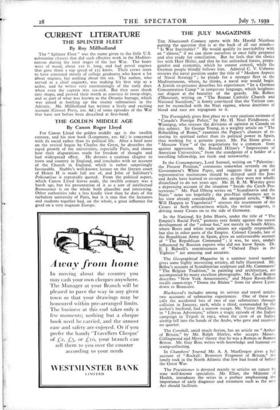For Canon Lloyd the golden middle age is the twelfth
century, and his new book (Longmans, ros. 6d.) is concerned with its social rather than its political life. After a brief note on the revival begun by Charles the Great, he describes the rapid growth of the universities, especially Paris, and shows how their disputations made for freedom of thought and had widespread effect. He devotes a cautious chapter to town and country in England, and concludes with an account of the Church in England, which is rather surprisingly favourable. Stubbs's well-known lecture on the literary court of Henry II is made full use of, and John of Salisbury's Policraticus is repeatedly quoted. From the political aspect, which Canon Lloyd leaves aside, the twelfth century was a harsh age, but his presentation of it as a sort of intellectual Renascence is on the whole both plausible and interesting. Other authorities take a less kindly view than he does of the turbulent university of Paris, but it is true that the lecturers and students together had, on the whole, a great influence for good on a very stagnant Europe.










































 Previous page
Previous page